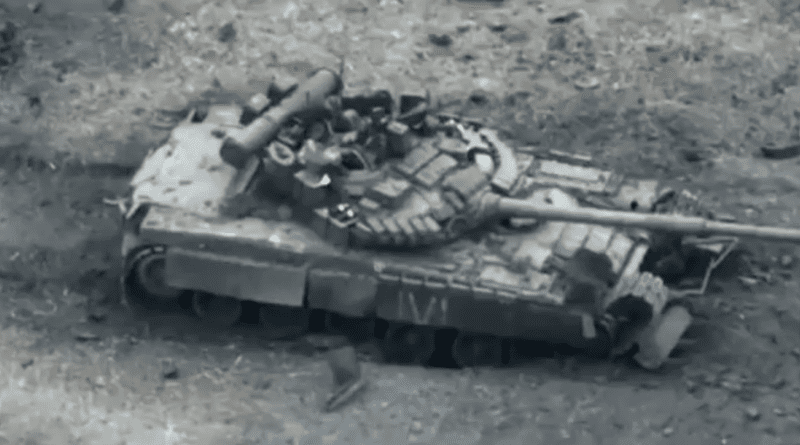US Doesn’t Foresee Russia Making ‘Major’ Territorial Gains In Ukraine This Year
By VOA
The United States does not believe Russia will “make major territorial gains” in Ukraine this year, U.S. intelligence chief Avril Haines told lawmakers on Wednesday, and may have trouble sustaining its year-long offensive.
She told the Senate Intelligence Committee that Russia is “suffering high casualty rates” and that if it “does not institute a mandatory mobilization and identify substantial third-party ammunition supplies, it will be increasingly challenging for them to sustain even the current level of offensive operations.”
Haines, as part of a broad-ranging assessment of global threats to the United States, said that Russian President Vladimir Putin “is likely better understanding the limits of what his military is capable of achieving and appears to be focused on more modest military objectives for now.”
She said the Russians “may fully shift to holding and defending the territory they currently occupy,” mostly in Ukraine’s eastern regions.
Still, Haines, the U.S. director of national intelligence, assessed that “Putin most likely calculates that time works in his favor and that prolonging the war, including with potential pauses in the fighting, may be his best remaining pathway … even if it takes years.”
Haines testified as U.N. Secretary-General Antonio Guterres assailed Russia’s invasion of Ukraine as a violation of international law as he arrived in Kyiv for talks with Ukrainian President Volodymyr Zelenskyy on extending grain shipments from the war-torn country and securing the safety of the Zaporizhzhia nuclear power plant.
“The sovereignty, independence, unity and territorial integrity of Ukraine must be upheld, within its internationally recognized borders,” Guterres said ahead of talks with Zelenskyy.
“Our ultimate objective is equally clear: a just peace based on the U.N. Charter, international law and the recent General Assembly resolution marking one year since the start of the war,” he said.
But with fighting raging and no peace talks on the horizon, Guterres said the U.N. is trying “to mitigate the impacts of the conflict, which has caused enormous suffering for the Ukrainian people—with profound global implications.”
He called for the continuation of Ukrainian grain shipments through the Black Sea with Russian acquiescence. He said that since last July, 23 million tons of grain have been exported from Ukrainian ports, much of it shipped to impoverished countries. Absent a new agreement, the program is set to expire March 18.
Guterres said the grain exports have “contributed to lowering the global cost of food” and offered “critical relief to people, who are also paying a high price for this war, particularly in the developing world. Indeed, the Food and Agriculture Organization’s Food Price Index has fallen by almost 20% over the last year.”
“Exports of Ukrainian—as well as Russian—food and fertilizers are essential to global food security and food prices,” he said.
Guterres also called for “full demilitarization” of the region around the Zaporizhzhia nuclear power plant, Europe’s largest, where nearby fighting has periodically shut down the facility and raised fears of a catastrophic nuclear meltdown.
Attempts for months to end fighting in the region have failed but Guterres said that safety and security near the power plant are vital so that the facility can return to normal operations.
EU defense ministers
Meanwhile, European Union defense ministers gathered Wednesday in Stockholm with a push to provide more ammunition to Ukrainian forces high on their agenda.
Speaking to reporters ahead of the meeting, Estonian Defense Minister Hanno Pevkur advocated for EU countries to provide money to jointly procure ammunition for Ukraine, arguing that that effort will boost the capacity of the industry and help EU security in the future.
EU foreign policy chief Josep Borrell told reporters that in addition to a joint effort to expand defense industry capacity, EU members should also in the short term provide ammunition quickly to Ukraine from their existing stocks. Borrell said sending what is available now could be accomplished in a matter of weeks.
“The issue is how to provide the ammunition Ukraine needs to continue defending,” Borrell said.
Ukraine has asked in particular for allies to provide more 155-millimeter artillery rounds.
“There is enormous demand out there,” NATO Secretary-General Jens Stoltenberg told reporters Wednesday. “The current rate of consumption compared to the current rate of production of ammunition is not sustainable and therefore we need to ramp up production.”
Stoltenberg said the conflict is “now a war of attrition.”
Bakhmut fighting
The NATO chief also said he could not rule out the Ukrainian city of Bakhmut falling into Russian control in the coming days.
“Therefore, it is also important to highlight that this does not necessarily reflect any turning point of the war, and it just highlights that we should not underestimate Russia,” Stoltenberg said. “We must continue to provide support to Ukraine.”
Hours earlier, the head of Russia’s Wagner Group mercenaries, Yevgeny Prigozhin, said its units had taken control of the eastern part of Bakhmut.
Russia has been trying to seize the city for months.
Prigozhin said Wagner forces controlled all districts east of the Bakhmutka River, which would represent about half of the city.
Russian Defense Minister Sergei Shoigu said Tuesday that seizing Bakhmut was important for launching further offensive operations in the region.
Ukrainian leaders have said in recent days they intend to keep fighting in Bakhmut.
VOA national security correspondent Jeff Seldin contributed to this report.

